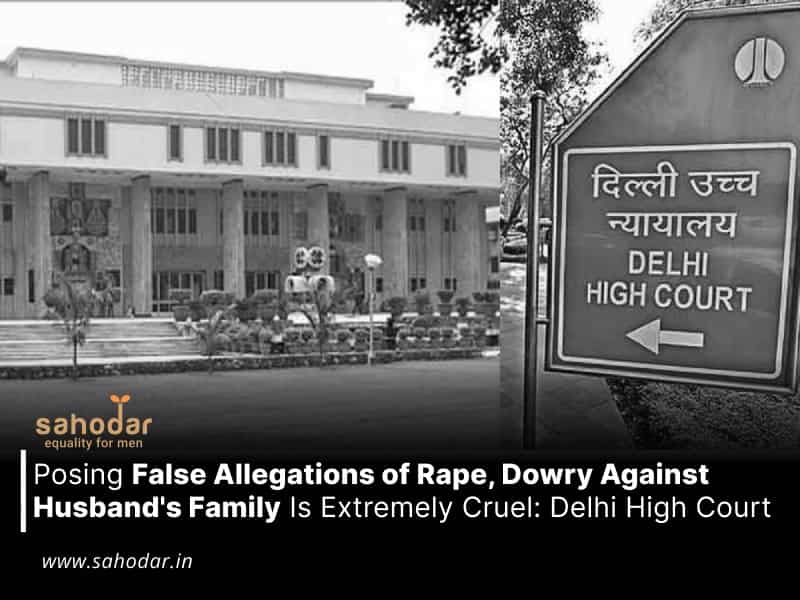The Delhi High Court recently observed that a wife making false allegations of rape and dowry harassment against the family members of her husband would amount to extreme cruelty and there can be no condonation for it.
A bench of two justices comprising Justice Suresh Kumar Kait and Neena Bansal Krishna said that such false complaints by the wife against her husband is mental cruelty and the husband can claim divorce on this ground.
The Court added, “It cannot be overlooked that making serious allegations of not only dowry harassment but of rape against the family members of the respondent which are found to be false, is an act of extreme cruelty for which there can be no condonation… Ultimately, if it is found that such allegations were unwarranted and without basis, the husband can allege that mental cruelty has been inflicted on him and claim a divorce on such a ground.”
The Court made this observation while dealing with an appeal filed by a woman challenging a family court order granting divorce to the husband on the grounds of mental cruelty.
The Couple got married on November 24, 2012 with Hindu rites and customs, but the wife left her matrimonial home after a couple of years of marriage.
On this, the wife alleged that the husband never gave her the status of a wife and that on February 17, 2014, her brother-in-law committed rape on her.
She also told the Court that her husband and his family also used to taunt her for being handicapped and not bringing sufficient dowry.
The Court, however, found that though a case under Sections 498A (cruelty to woman) and 376 (rape) of the Indian Penal Code (IPC) was filed against the husband and his brother but they were exonerated of all these allegations. It also noted that the wife had written an apology letter wherein she admitted that no event of harassment was taken place as claimed by her.
It further observed that no evidence was presented to show that the marriage was not consummated; as per the wife’s allegations. Rather, it opined that there was sufficient evidence to prove that the wife was not sure to live with her husband.
The Court emphasized that it was an act of extreme cruelty to deprive a spouse of the other’s company and that the core fundamental of any marital relationship is cohabitation and a conjugal relationship.
It said, “For a couple to be deprived of each other’s company, proves that the marriage cannot survive, and such deprivation of conjugal relationship is an act of extreme cruelty.”
In terms of cruelty, the Court held that there is no specific aspect to categorize or conclusively define what would be cruel.
It is the result of the conduct rather than its nature which is of paramount importance in assessing a complaint of cruelty, the Court underscored.
The Court also explained, “The Court must bear in mind the physical and the mental conditions of the parties as well as their social status and should consider the impact of the personality and the conduct of one spouse on the mind of the other, weighing all incidents and quarrels between the spouses from that point of view and such conduct must be examined in the light of the capacity and endurance of the complainant and to what extent such capacity was known to the other spouse. Malevolent intention is not essential to cruelty but it is an important element where it exists.“
In the mentioned case, the Court also noted that the couple had been living separately for around 9 years. It said that it is an instance of ‘utmost mental cruelty’, which would result in immediate severance of the matrimonial relationship.
The Court, therefore, upheld the order of the Family Court and dismissed the appeal of the wife.
Advocate Pradeep Kumar appeared for the wife. The husband appeared in person.
Source: https://www.barandbench.com/news/extremely-cruel-false-allegations-rape-dowry-harassment-husband-family-delhi-high-court

